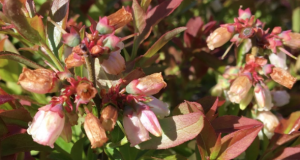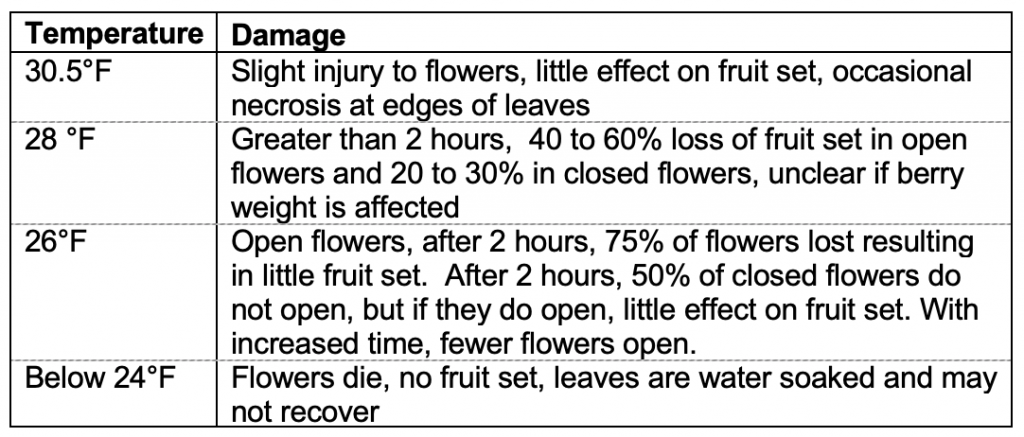Wild Blueberry Newsletter June 2020

June 2020
Wild Blueberry Growers and Processors,
The good news is that we are able to do a lot of our planned research this summer. We are working hard in at least 30 fields this summer with our masks and hand sanitizer. The sad news is that the annual Blueberry Hill Farm Field Day has been cancelled. I am a member of the UMaine Extension “Starting Safely” committee where we hope to reach consensus around whether any small field days will be possible this year.
This has been a challenging spring for many reasons but on top of it all, most wild blueberry fields had freezing overnight temperatures 5/31-6/1 and 6/1-6/2. Check the Blueberry Blog and AgriNet to see how cold it was in your location. Some fields already had some fruit set before the frost event and continued to bloom after the event. In other locations, the top few flowers were hit but lower flowers appear to be fine making it difficult to tell how much of the crop was lost. Overall leaves in fields look more red than usual due to the frost event. We have also seen evidence of mummy berry and flea beetle pest pressure in fields within the past 7-10 days – unrelated to frost.
 Frost events can damage flowers visibly by browning the flower (see picture), but also internally. Internal damage may not appear until after fruit set when a lack of fruit development is observed. You can check the green fruit in your field for frost damage by cutting fruit open. Undamaged berries will be green inside, while damaged berries will be brown inside. Damage will vary depending on local conditions in your field and the stage that the wild blueberry plants were in when cold temperatures occurred. Typically, lower sections of fields experience more frost damage than higher points. According to research conducted in Nova Scotia, wild blueberry flowers and leaves have the following effects from exposure to cold temperatures. Open flowers are more susceptible to freezing damage than closed flowers. Freezing temperatures can also affect whether or not closed flowers will open. The colder temperatures were, the more likely it is that fruit set will be damaged, regardless of the length of time that it was cold.
Frost events can damage flowers visibly by browning the flower (see picture), but also internally. Internal damage may not appear until after fruit set when a lack of fruit development is observed. You can check the green fruit in your field for frost damage by cutting fruit open. Undamaged berries will be green inside, while damaged berries will be brown inside. Damage will vary depending on local conditions in your field and the stage that the wild blueberry plants were in when cold temperatures occurred. Typically, lower sections of fields experience more frost damage than higher points. According to research conducted in Nova Scotia, wild blueberry flowers and leaves have the following effects from exposure to cold temperatures. Open flowers are more susceptible to freezing damage than closed flowers. Freezing temperatures can also affect whether or not closed flowers will open. The colder temperatures were, the more likely it is that fruit set will be damaged, regardless of the length of time that it was cold.
Temperature effects on wild blueberry flowers and leaves according to Hall et al. 1971, Hall and Hildebrand, 1988, and Hicklenton et al., 2002.
Pesticide Applicators
Developing online courses takes longer than I thought! Sprayer calibration and weed management videos for pesticide credits are still being created for you. As a reminder, commercial applicators need to earn 6 credits per 3 year cycle. Those credits must be completed by December 31 in the third year. If you are applying for a new license and need to take the exam, exams are taking place in your own car at specific times. To schedule an exam call Jan Betts at 207-287-2731.
Directly from the EPA: Temporary guidance from the EPA was released to outline approaches to address the unavailability of required respiratory protection and respiratory fit testing that should first be exhausted before considering any alternative options. Options include:
- Use alternative NIOSH-approved respirators offering equivalent or greater respiratory protection than those required on the pesticide label;
- Hire commercial applicator services with enough respirators and respiratory protection capabilities;
- Opt to use agricultural pesticide products that do not require respirators; or
- Delay pesticide applications until another compliant option is available.
If the above options are exhausted, EPA’s guidance provides additional options with strict terms, conditions, and exhaustion requirements to minimize potential incremental risks to workers:
- Reuse and extended use of disposable N95 filter facepiece respirator;
- Use of “expired” respirators;
- Use of respirators certified in certain other countries or jurisdictions meeting protective conditions outlined; or
- Delay the annual respirator “fit test.”
This is a temporary policy. EPA will assess the continued need for and scope of this temporary guidance on a regular basis. To read the guidance in full and to learn more about EPA’s Worker Protection Standard, visit this webpage.
Odds and Ends
Survey Postcard
The UMaine Wild Blueberry Research and Extension team has been compiling a survey for wild blueberry growers, processors, and stakeholders in Maine. A postcard will be arriving in the mail to you soon so please do not throw it away. There are prizes involved! The goal of this survey is to gain a better understanding of production practices, current land under management, and market avenues.
Cloth Masks
The first batch of cloth masks has been picked up from Augusta and they are in the mail to you. The next round will be coming soon. If you have not requested cloth masks from DACF, there is still time to do so here.
Sincerely,
Lily

